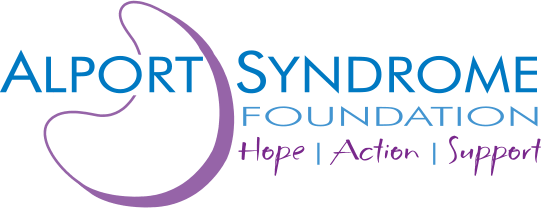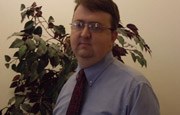I‘ve grown up with Alport syndrome (hereafter referred to as AS) all my life. I should clarify that. Growing up I knew that there was some kidney thing in the family that my grandfather had died from but I didn‘t know a lot about it.
When starting my first professional job I was denied for life insurance. After asking I was told that my lab work showed some kind of kidney disease. I called my mom that night and said, “What is this kidney thing I have?“ Looking back now it‘s somewhat humorous, and scary, how casual I was about it. I just did not know what AS was or the impact it would have on my life.
Turns out I was not the only family member with AS. Of the 12 male cousins in my family that could have AS, 5 of us have AS. As of this writing (April 2007) 3 of us have had successful transplants and the other 2 are still waiting the onset of kidney failure. Besides the blood in the urine that a lab test would always identify I was healthy, leading a normal active life.
Shortly after our marriage my wife wondered why I had to have the volume on the TV so loud. After 2 years I finally agreed that I it was louder than it had been and agreed to be tested. I‘ve worn hearing aids ever since. I was quite surprised by how much I had been missing. In my family hearing loss happens about the same age for all of us so each family reunion includes a section where we swap stories about what works and what doesn‘t. Not that exciting for everyone else, but it‘s been helpful for me.
My grandfather died one month shy of his 32nd birthday. I knew that he suffered immensely for some time before that. Through regular visits with my Nephrologist and lab tests at about my 30th birthday the signs became clear that my kidneys were beginning to fail. In an incredibly generous offer all of my siblings agreed to be tested to see if they were a compatible donor. One of my sisters was the best match and on November 5th, 1998 she donated a kidney to me in a surgery that lasted 4 ““5 hours. This surgery was completed by the wonderful staff at LDS Hospital in Salt Lake City, Utah.
Recovery was quick. I was home within 5 days and back to work within 2 and ½ weeks. The body truly is an amazing thing!
My life returned to normal. That is if you consider taking 30+ pills every day and regular lab tests normal. I got back into my daily routine. I became much more familiar with the work of the Hereditary Nephritis Foundation and I joined Delphi Forums Alport Forum.
During the winter of 2003 my body began to reject my transplanted kidney. I was hospitalized numerous times. In March the doctor informed me that I could start dialysis anytime. On April 11 I was admitted to Utah Valley Regional Medical Center in Provo, Utah and began hemodialysis.
This was an incredibly traumatic experience. First, I lost nearly 40 pounds in 11 days. I came very close to dying, mostly because I felt so bad I wouldn‘t eat. (When I was released I was eating saltine crackers and broth – that was all my stomach would handle.) Second, I had the mistaken belief that dialysis would make me feel good. It did not! (I should note that for some people it does, but I‘m not one of those). I thought that a machine cleaning my blood would make me feel clean. Instead I felt washed out.
I became a very grouchy and irritable person to live with. After about 10 months, one of the dialysis nurses suggested I would be a good candidate for peritoneal dialysis. By this time I was willing to consider any possible changes. Peritoneal dialysis allowed me some control over my schedule. I did feel better, but still not wonderful. My health and emotions were on a constant roller coaster.
Luckily my work was incredibly accommodating of my schedule. I was able to stay employed throughout all this time. I was also able to continue with one of my hobbies, which is Boy Scouting. I was able as Scoutmaster to attend a weeklong summer camp in the mountains of central Utah while doing peritoneal dialysis.
The town where we lived was 3 hours from my doctor, and the hospital he often enrolled me in. When the chance came to take a job closer to the doctor, hospital, and transplant center we took it. Shortly after this on December 16th, 2004 I received a call at work telling me to be at the University of Utah Hospital as soon as possible. At three that afternoon I was in surgery and received my 2nd kidney transplant.
When I awoke from the surgery I immediately knew that things were better. I felt good. I felt so good that I was completely wired for about 24 hours. I could not sleep. I could not get over how good I felt. Those feelings did not leave. I remember thinking repeatedly that I‘d forgotten things could feel like this. It was electrifying!
Anyone who has been on dialysis knows that the diet is very strict. I had learned through hard experience that it is worth it to follow the diet. However, within 2 days of my surgery I ate some of everything that had been prohibited while on dialysis ““ pickles, tomatoes, orange juice, bananas, potatoes, and chips and salsa. It was wonderful.
One of the negative things about those 20 months of dialysis was that they had been quite hard on my family, especially on my wife. For almost 2 years I was not available to give her any kind of emotional support. This time was not physically trying for her, but it was very emotionally and psychologically trying. Not only was she dealing with me and all my aches, pains, and my grumblings, but also with the fear that I might die and she would be left to raise our kids on her own. She had had to build another emotional support system through some friends.
After moving to another town (the friends were now 3 hours away) and the transplant, we found that we had grown apart. It took many heart to heart conversations, some weekend getaways, and lots of validation for our relationship to rebuild. My kids did better with all of this, but that was because my wife tried very hard to make life seem normal as possible for them. My wife is a saint!
Today we do not talk much about those 20 months on dialysis. They really are something that we‘ve all chosen not to remember. (There are parts I really don‘t remember.) We dread my new kidney being rejected and having to go through dialysis again. (Again, I must note, that others have had very different experiences with dialysis than mine. Please don‘t assume that you will go through what I did.)
It was during this recovery time and redevelopment of my relationships with my family that I became determined to do something about AS. I renewed my contact with the Alport Forum. I was dismayed to discover that the Hereditary Nephritis Foundation had disbanded due to lack of support. (Dr. Curt Atkin‘s death in 2000 had not helped.)
I met with Kay Johnson, Dr. Joyce Denison, and Dr. Martin Gregory of the University of Utah Alport Studies, who had been involved with the Foundation for many years to see what could be done. I posted notes on the Alport Forum seeking others who were interested in doing something. The history of the Alport syndrome Foundation can be found elsewhere, but through these initial discussions some ideas grew. About a year later Sharon Lagas and Margaret Blue called and asked what my plans were for a renewed foundation. From that phone call all of this has grown.
My Alport story has not ended. I expect that before I die I will undergo dialysis at least one more time. When that happens I hope that another transplant will also be in my future. More important to me is that when my daughter has children (if she chooses to) there is a 50/50 chance that any of her kids will have the AS gene. Before that day comes I want to see the same leaps and advances in medical science and the treatment of AS that exist between my grandfather‘s death and my own kidney failure. A worthy goal that if nothing else will keep me busy.


